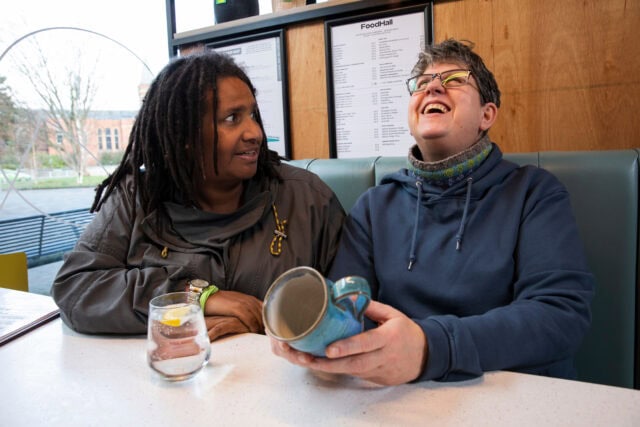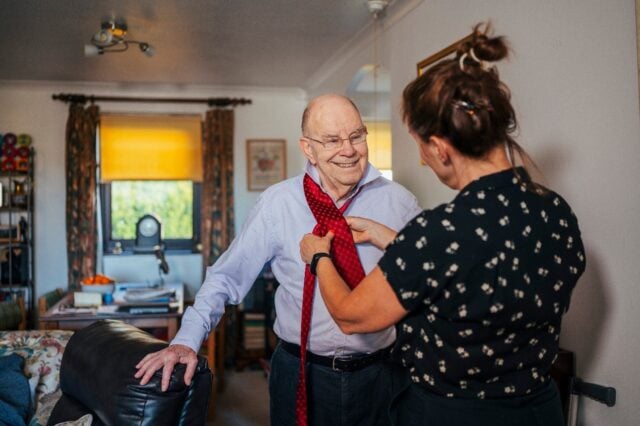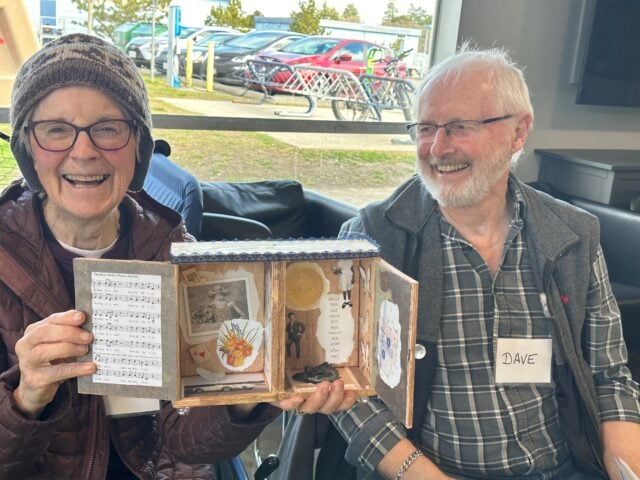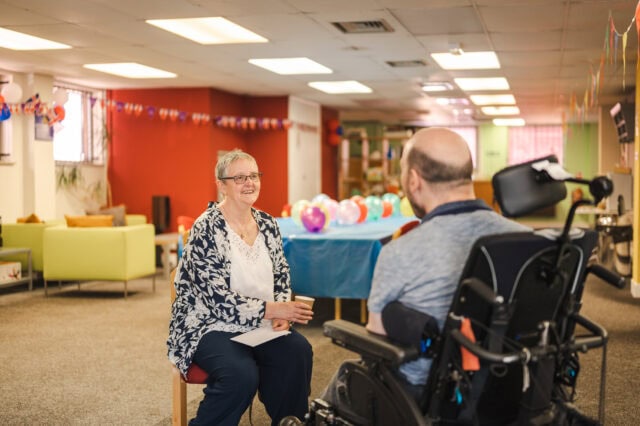By Dr. Yael Goldberg, PhD, CPsych and Isabelle Messa, M.A.
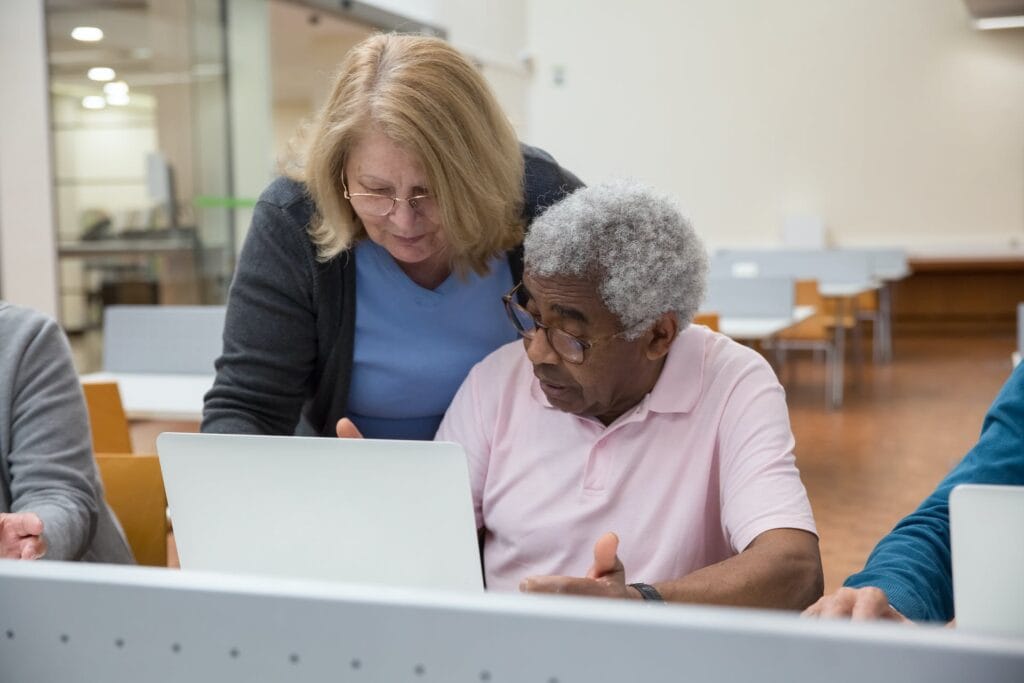
Whether you are a health care professional or a family caregiver, caring for an individual with dementia is not easy. The experience can be isolating, and it can be extremely challenging to navigate the difficult situations you may now find yourself in. The good news is that expert advice and support is now widely available online.
One interesting example of virtual supports is Baycrest’s Virtual Behavioural Medicine (VBM) Program, which helps clients and families manage the severe, neuropsychiatric symptoms of dementia, also known as responsive behaviours, through a secure digital platform.
Within the VBM program, neuropsychologicial services are provided by Dr. Yael Goldberg, a registered clinical psychologist and neuropsychologist, and Isabelle Messa, a PhD candidate at the University of Windsor. Together with an interdisciplinary team, they provide non-pharmacological behaviour management services to healthcare teams and family caregivers across the Greater Toronto Area. The VBM program is available to help anyone referred to the program by a doctor or a nurse practitioner who may be living in the community, retirement home, is in an acute care, post-acute care, or rehabilitation hospital, or is living in long-term care.
The neuropsychology service within the VBM program is comprehensive. First, they conduct functional behaviour analyses, whereby behaviours are identified in the context of their antecedents and consequences, examine multiple contributing factors and the efficacy of previously trialed interventions. They then use this information to develop individualized behavioural intervention plans and offer implementation support. Because there is often significant burnout experienced by health care teams and family caregivers, they also offer short-term supportive counselling focused on resilience, coping, and building readiness to engage in intervention implementation using a strengths-based approach. The goal of the service is to empower carers of individuals with dementia by helping them to develop the skills and confidence they need to effectively manage these difficult dementia-related behaviours using non-pharmacological strategies as much as possible.
Below are some resources recommended by Yael and Isabelle that can help to increase your understanding of dementia and dementia-related symptoms, teach you how to best manage dementia-related behaviour change, and increase your awareness of the many resources available online for health care providers, care partners and families supporting people experiencing behaviours in dementia.
Alzheimer Society of Canada
The Alzheimer Society offers a number of resources for individuals with dementia and their families, including resources specific to understanding and responding to dementia-related behaviours. as well as more general and comprehensive resources for caregivers.
- Conversations About Dementia and Responsive Behaviours https://alzheimer.ca/sites/default/files/documents/conversations_dementia-and-responsive-behaviours.pdf
- Changes in how grief, pain, anger or overwhelm might be expressed https://alzheimer.ca/en/help-support/im-caring-person-living-dementia/understanding-symptoms/changes-how-grief-pain-anger)
- I’m caring for a person living with dementia https://alzheimer.ca/en/help-support/im-caring-person-living-dementia)
iSupport for Dementia
https://www.who.int/publications/i/item/9789241515863
iSupport for Dementia is a training and support programme offered by the World Health Organization both in the form of a manual and online. The programme is designed for carers of people with dementia and aims to prevent and/or decrease mental and physical health problems associated with caregiving and to improve the quality of life of those caring for people with dementia. The programme includes five modules including an introduction to dementia, being a caregiver, self-care, providing care, and, notably, a module on dealing with the behaviour changes associates with dementia.
Baycrest
https://www.baycrest.org/Baycrest/Health-Wellness/Health-Wellness-Information/Caregiving
Baycrest provides a collection of resources for caregivers, including various informational and educational resources, support services, as well as products, manuals, and guides. The Dementia: A Caregiver’s Guide (https://www.baycrest.org/baycrest-pages/about-baycrest/publications/guides-manuals/dementia-a-caregiver%e2%80%99s-guide-(1)), in particular, provides practical tips and coping strategies in various domains, discusses treatments, medications, and legislation, and also contains sections on special interest topics such as sleep and travel.
Enhancing Care for Ontario Care Partners
The Enhancing Care for Ontario Dementia Care Partners Program, run by Mount Sinai Hospital’s Reitman Center for Alzheimer’s Support and Training, provides clinical services and group programs for care partners of people living with dementia, free of charge, both in-person and online. The goal of the program is to help care partners across Ontario manage the stresses associated with caring for a person living with dementia. The website also offers a variety of online resources for care partners, including tip sheets, coaching simulation videos, answers to questions commonly asked by dementia care partners, and more.
Ontario Caregiver Organization
The Ontario Caregiver Organization has as its mission to support caregivers in Ontario who provide physical and emotional support to a family member, partner, friend, or neighbor. Their website (https://ontariocaregiver.ca/for-caregivers/) offers an abundance of resources for caregivers including access to a 24/7 helpline (as well as a live chat), peer support, webinars for caregivers, counselling, and resources specific to caregivers who are members of various minority groups, among others.
_ _ _


This article was contributed by Dr. Yael Goldberg, a registered Clinical Psychologist and Neuropsychologist at Baycrest, and Isabelle Messa, a PhD candidate at the University of Windsor. Yael brings 7 years as a Clinician Leader on Baycrest’s Behavioural Neurology Unit to her current role within Baycrest’s Virtual Behavioural Medicine (VBM) Program.
Learn more about the Virtual Behavioural Medicine (VBM) program here:
Would you like to curate a resource list for the Behaviours in Dementia Toolkit? Reach out to CCSMH knowledge broker Nick Ubels at [email protected]

